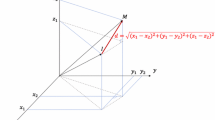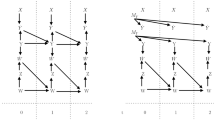Abstract
We explore differential equations involving alcoholism, socialmobility, excess female mortality, and international arms competition.In each of these instances we show that the initial equation, orsystem of equations, has a sociological plausibility comparable tothat of the associated solutions; the solutions do indeed describetime-series trajectories that seem to represent important and uniquesocial processes. We argue that the central challenge of differentialequation modeling is to use experimentation to clarifyrelationships between, on the one hand, the equations andtheir coefficients and, on the other, the solutions and thetime-series orbits created by them. Such feedback interaction ofdifferential equations and their solutions appears to be the basis forfurther theoretical insight, and rapid assessments of theseinteractions are now possible largely because modern softwareencourages experimentation with many combinations of inputcoefficients.
This paper expands on an argument made by Nielsen and Rosenfeld(1981, p. 161), who recommend that differential equations be interpreted in a way that emphasizes their solutions, i.e., the time-seriestrajectories of Yvalues, the orbits of Y, taken torepresent behavior of dependent variables through time. We concludethat the most edifying interpretations of differential equations focuson the equations themselves, the resulting trajectories, therelationships between equations and trajectories, and the theoreticalsignificance of all three.
Similar content being viewed by others
References
Abell, M. L. and Braselton, J. P.: 1994, Maple V by Example, Academic Press, Boston.
Allison, P. D. and Stewart, J. A.: 1974, Productivity differences among scientists: Evidence for accumulative advantage, American Sociological Review 39, 596-606.
Bentley, R. and Blackburn, R.: 1990, Changes in academic research performance over time: A study of institutional accumulative advantage, Research in Higher Education 31, 327-345.
Brown, S. and Lewis, V.: 1999, The Alcoholic Family in Recovery: A Developmental Model, Guilford, New York.
Collins, R.: 1975, Conflict Sociology: Toward an Explanatory Science, Academic Press, New York.
Denzin, N. K. 1987, The Recovering Alcoholic, Sage, Newbury Park, CA.
Dorn, H. F.: 1959, Mortality, In P. M. Hauser and O. D. Duncan (eds), The Study of Population: An Inventory and Appraisal, University of Chicago Press, Chicago.
Dowling, E. T.: 1990, Theory and Problems of Calculus for Business, Economics, and the Social Sciences, McGraw-Hill, New York.
Ellis, W. Jr. et al.: 1997, Maple V Flight Manual, Release 4: Tutorials for Calculus, Linear Algebra, and Differential Equations, Brooks/Cole, Pacific Grove.
Faia, M. A.: 1975, Productivity among scientists: A replication and elaboration, American Sociological Review 40, 825-829.
Faia, M. A.: 1986, Dynamic Functionalism: Strategy and Tactics, Cambridge University Press, New York.
Harris, M. and Ross, E. B.: 1987, Death, Sex, and Fertility: Population Regulation in Preindustrial and Developing Societies, Columbia University Press, New York.
Keyfitz, N.: 1968, Introduction to the Mathematics of Population, Addison-Wesley, Reading, MA.
McDonough, J. L.: 1977, Shiloh-In Hell before Night, University of Tennessee, Knoxville.
Merton, R. K.: 1973, The Sociology of Science: Theoretical and Empirical Investigations, University of Chicago Press, Chicago.
Mitroff, I. I. and Chubin, D. E.: 1979, Peer review at the NSF: A dialectical policy analysis, Social Studies of Science 9, 199-232.
Nielsen, F. and Rosenfeld, R. A.: 1981, Substantive interpretations of differential equation models, American Sociological Review 46, 159-174.
Olinick, M.: 1978, An Introduction toMathematical Models in the Social and Life Sciences, Addison-Wesley, Reading, MA.
O'Reilly, E. B.: 1997, Sobering Tales: Narratives of Alcoholism and Recovery, University of Massachusetts Press, Amherst.
Peter, L. J. and Hull, R.: 1969, The Peter Principle, W. Morrow, New York.
Phillips, D. P.: 1993. Psychology and survival, Lancet 342, 1142-1145.
Redfern, D. and Chandler, E.: 1996, The Maple O.D.E. Lab Book, Springer-Verlag, New York.
Richardson, L. F.: 1960, Arms and Insecurity: A Mathematical Study of the Causes and Origins of War, Boxwood Press, Pittsburgh.
Shone, R.: 1997, Economic Dynamics: Phase Diagrams and their Economic Application, Cambridge University Press, Cambridge.
Smith, B. D.: 1995, The Emergence of Agriculture, W. H. Freeman, New York.
Soroka, M. P. and Bryjak, G. J.: 1995, Social Problems: A World at Risk, Allyn and Bacon, Boston.
Stinchcombe, A. L.: 1968, Constructing Social Theories, Harcourt Brace, New York.
Sulloway, F. J.: 1998, Born to Rebel: Birth Order, Family Dynamics, and Creative Lives, Abacus, London.
Weeks, J. R. 1999, Population, Wadsworth, Belmont, CA.
www.nytimes.com/library/world/asia/061198asia-econ.html.
Zill, D. G.: 1997, A First Course in Differential Equations with Modeling Applications, Brooks/Cole, Pacific Grove, CA.
Author information
Authors and Affiliations
Rights and permissions
About this article
Cite this article
Faia, M.A. Differential Equation Modeling as a Source of Theoretical Insight: Four Disparate Examples. Quality & Quantity 36, 169–195 (2002). https://doi.org/10.1023/A:1014976416218
Issue Date:
DOI: https://doi.org/10.1023/A:1014976416218




